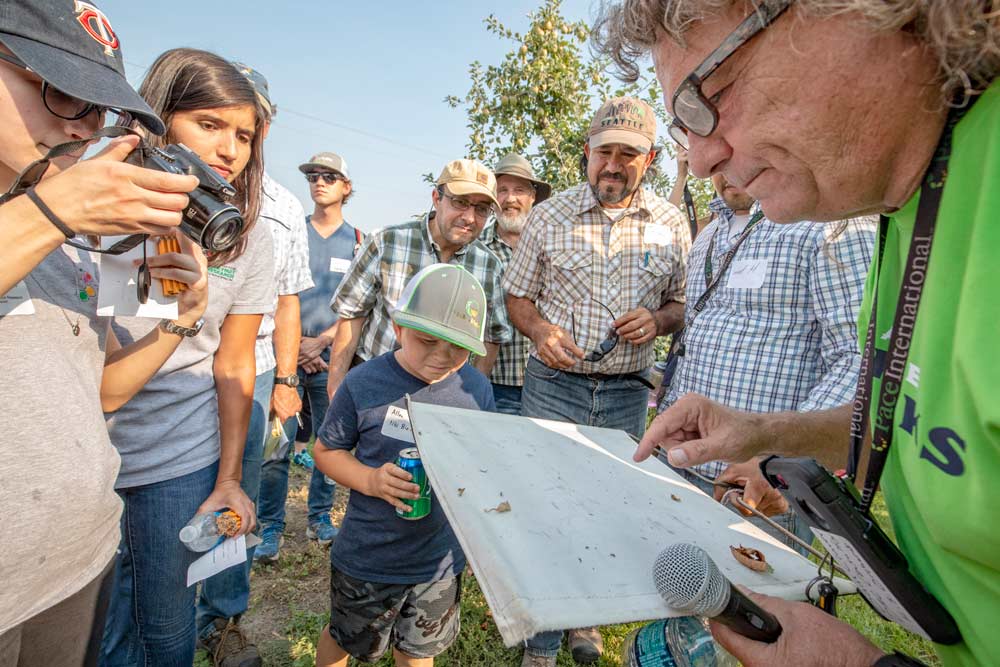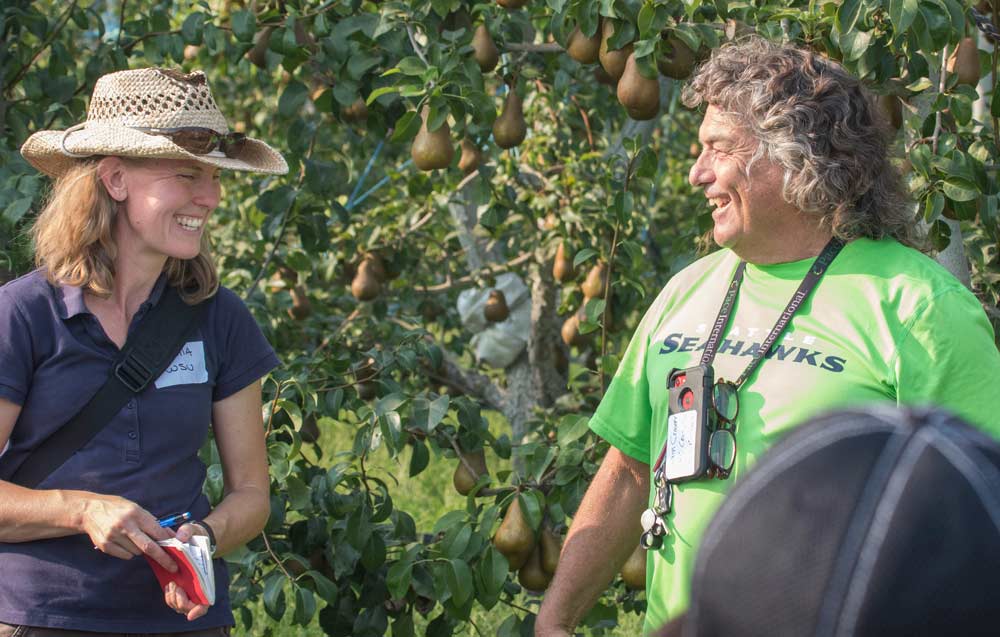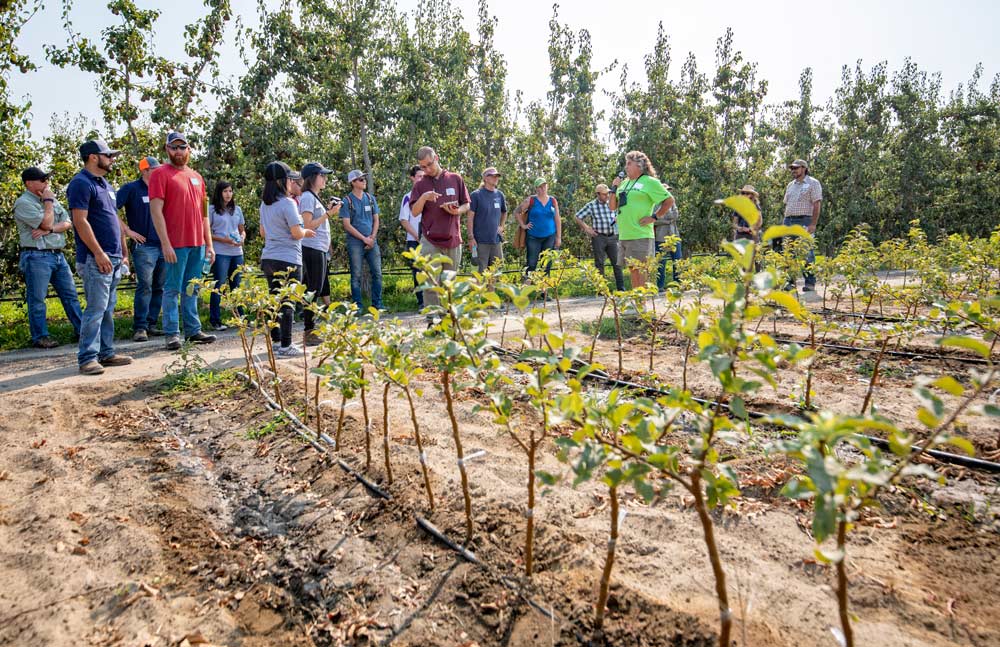
Grower Dain Craver, right, shows attendees and researchers how to scout for pests during one of Washington State University’s field days targeting younger growers in Royal City, Washington, in August. (Photos by TJ Mullinax/Good Fruit Grower)
It’s no secret that the average age of American farmers is nearing what would be considered retirement age in most industries, and the tree fruit industry is no exception. That’s why cultivating the next generation — or two! — of leaders is critical to the industry’s future, and it was one of the top priorities growers shared with Tianna DuPont when she started in her role as extension specialist at Washington State University three years ago.
“It kept coming up that they wanted to see more support for the next generation,” she said. So, she began organizing events for early-career industry professionals, known as the Next Generation Network, or NextGen for short. “We’re specifically looking for topics and an environment where people felt comfortable discussing, asking questions and networking with their peers. We don’t exclude anyone, but our target is to create that feeling,” she said.
In the past two years, the network has hosted 16 events, including orchard tours, discussion groups and a drone demo. Growers always welcome the group, DuPont said, agreeing to host because they want to support and share knowledge with the next generation.
“It seems like our industry is mostly in this older generation, people with 20 to 30 years of experience and for a while there we didn’t see younger kids coming back in,” said grower Dain Craver, who hosted the group at a Columbia Basin orchard to share organic integrated pest management strategies. “Now, we’re seeing more younger people come in than we did in years past. There’s a lot of new faces and we need those new faces to carry our industry forward.”

Tianna DuPont of Washington State University’s Tree Fruit Extension and Craver, right, share a laugh at the conclusion of one of DuPont’s Washington State University young grower group meetings.
The Washington group is inspired, in part, by the tree fruit industry’s original young grower group that started in the mid-Atlantic region. Young grower groups have also started gathering together in the Lake Ontario region of New York and in Grand Rapids, Michigan, for tours, and a smaller group meets in Virginia, where they often do joint events with the Pennsylvania-based group.
Young growers there have been gathering for tours and workshops since 2005, long enough for the original members to no longer consider themselves the “young growers.”
Generally, it’s an under-35 crowd, but they “never check ID,” said Sarah Lott Zost, an Adams County, Pennsylvania, grower and current co-chair of the Young Growers Alliance that now has several hundred members.
Now in his 40s, Corey McCleaf still regularly attends and helps to plan YGA events, which he credits with lots of new ideas for his diverse, farm-market-focused fruit and produce farm in Adams County. The group was an important source of education and camaraderie early in his career, he said.
“When I started farming, I thought I was the only young person doing this,” he said.
Lott Zost agreed. There are lots of young people working on their family farms in the region, but “if you don’t get off the farm, you don’t meet them,” she said.
She described the group’s gatherings as a safe space to ask questions or share ideas, less intimidating than at a larger industry field day, and also a place to discuss points of friction young farmers may have with the generation above them. It helps to know that you’re not the only one butting heads about testing out a new trellis system or trying a new rootstock, she said, and having a community to discuss the complicated issues around intragenerational farming and transition is invaluable.
That sort of community support feeling hasn’t really developed yet at the Washington group’s events, board members Hannah Walters and Jake Robinson agreed. Those meetings have been more education-focused, and different people attend each event, depending on their interests.
“It’s a relatively new group and it’s not a tight-knit community, but I can see it moving in that direction,” Walters said.

Dain Craver, in green shirt, talks about new apple plantings.
And the group is not just for growers, she added. “We’ve got growers and people working in research with the industry and through the university and working at other support roles in the industry, so it’s pretty diverse,” she said.
Moreover, they are not all young, either. People who are older but also new to the industry are welcomed, Robinson said.
“We’re all kind of in the same boat as people with less experience in the industry, so we can feel comfortable asking the stupid questions,” Robinson said.
Craver said he was impressed by the questions from the NextGen group.
“This young generation, they are not afraid to pop out questions,” he said. “To me, no question is ever stupid, but to me, they seem to have more interest in learning, more excited to get the information.”
In addition to learning and networking, the NextGen group provides an opportunity for young people to take on leadership roles, DuPont said.
“One of the potential exciting things is growing leaders within the industry,” she said. “It’s a place that you find people that you might not otherwise know and give them opportunities.” •
-by Kate Prengaman






Leave A Comment